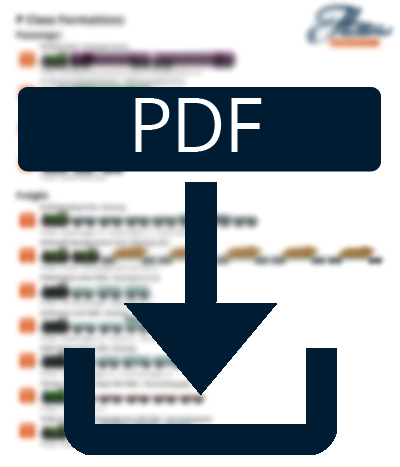SECR P Class 0-6-0T - Formations Guide
FORMATIONS DIAGRAM
SECR P Class 0-6-0T
The handy diagram below showcases some of the workings that you can produce with a Hattons SECR P Class 0-6-0T. We've covered an array of the models available, so there's a range of rakes that cover the lifespan of these tiny tank engines - with everything from local passenger workings, to light freight shunting and preservation brake van rides!
Explore the different rakes below, with links to the correct products used. Or scroll down to download/ print your own formations poster.
Passenger Services

| 753 SECR 1910s - Passenger Service | |
 |
|
| Products used: P Class, Birdcage Brake Composite Lavatory, Birdcage Brake Third |

| 27 "Primrose" Bluebell Railway 1960s - Passenger Service | |
 |
|
| Products used: P Class, Birdcage Brake Third Lavatory |

| 178 Bluebell Railway 2000s - Passenger Service | |
 |
|
| Products used: P Class, Mk1 TSO, Mk1 BSK |

| 323 "Bluebell" Bluebell Railway (Horsted Keynes) 2016 - Brake Van Rides |
 |
 |
|
| Products used: P Class, Queen Mary Brake |
Freight Services

| 27 SECR Reading 1910s - Shunting | |
 |
|
| Products used: P Class, 3 plank wagon x4, 5 plank wagon x2, 3 plank wagon |
| 5753 & 5027 Boulogne Docks 1916 - Shunting Tanks | |
 |
|
| Products used: P Class, P Class, Parrot wagon with tank load x5 |

| 31556 Brighton Shed 1950s - Shunting Loco Coal |
 |
 |
|
| Products used: P Class, 16t mineral wagon, 8 plank wagon x2 # |

| 31323 Dover Yard 1950s - Shunting |
 |
 |
|
| Products used: P Class, 5 plank wagon x2, 12t van x2, 5 plank wagon | |
| 31027 Chislet Colliery 1958 - Shunting | |
 |
|
| Products used: P Class, 16t mineral wagon x2, 21t mineral wagon x2 | |
| "Pioneer II" Bowaters Paper Mill 1960s - Trip Working (Paper) | |
 |
|
| Products used: P Class, 1 plank wagon x5 | |
| "Pride of Sussex" Robertsbridge Flour Mill 1965 - Trip Working (Grain) | |
 |
|
| Products used: P Class*, 5 plank wagon, Grain wagons x3 |
* - Not in current catalogue, may be available as a pre-owned item
|
Download/ Print the Formations Diagram |
|
 |
 |
Visit the Hattons P Class
|
or reload the browser
Like this article? Make sure to share it with your friends!
